Indonesia and the European Union have concluded negotiations on a long-awaited trade agreement after almost 10 years of discussions, Indonesian Economic Affairs Minister Airlangga Hartarto confirmed Tuesday.
The Indonesia–EU Comprehensive Economic Partnership Agreement (CEPA), signed in Bali by EU Trade Commissioner Maros Sefcovic and Airlangga, marks the bloc’s third major trade pact with Southeast Asia, following deals with Singapore and Vietnam.
The agreement opens the door to investment in key sectors such as electric vehicles, electronics, and pharmaceuticals. EU President Ursula von der Leyen said the deal would save European exporters around €600 million ($708 million) annually in duties and make European goods more affordable for Indonesian consumers.
Sefcovic stressed that the pact signals “a powerful message to the world” about the EU and Indonesia’s commitment to open and rules-based trade.
Shaped by Global Tariff Wars
Talks for the agreement began in 2016 but made slow progress due to disputes over palm oil and deforestation. Analysts noted that trade tensions under former US President Donald Trump’s tariff policies pushed both sides to accelerate negotiations.
Airlangga described the pact as a “ten-year journey” aimed at providing certainty amid global trade disruptions. Around 80 percent of Indonesian exports to the EU — including palm oil, footwear, textiles, and fisheries — will become tariff-free once the deal takes effect.
The EU is Indonesia’s fifth-largest trading partner, with bilateral trade reaching $30.1 billion in 2024. Experts say the agreement will significantly expand EU access to Indonesia’s vast market of 280 million people.
Green Policy Disputes
The deal also touches on sensitive environmental issues. The EU’s deforestation regulation — which restricts imports of goods linked to deforestation after December 2020 — has been a point of contention, particularly for Indonesia, a leading palm oil producer.
Airlangga said Sefcovic promised “special treatment” for countries with trade agreements, though activists warn the deal could accelerate forest clearance for palm oil plantations. Greenpeace Indonesia expressed concern that remaining natural forests in concession areas could be destroyed.
While Brussels reportedly pushed to include anti-deforestation provisions in the pact, details remain undisclosed.
Next Steps
Following Tuesday’s signing, the agreement will undergo legal checks and translations before ratification by the EU’s member states, the European Parliament, and Indonesia’s legislature.
Implementation is expected by 2027, according to Airlangga.



